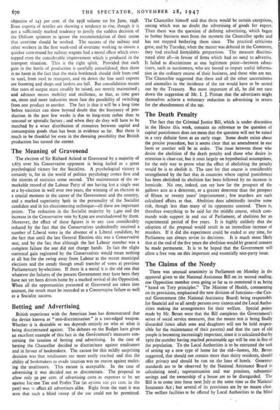The Death Penalty
The fact that the Criminal Justice Bill, which is under discus'sion in the House this week, contains no reference to the question of capital punishment does not mean that the question will not be raised in a very definite form at an early stage. Some doubt exists about the precise procedure, but it seems clear that an amendment in one form or another will be in order. The issue between those who desire the abolition of the death penalty and those who desire its retention is clear-cut, but it rests largely on hypothetical assumptions, for the only way to prove what the effect of abolishing the penalty would be is to abolish it. The case for that course is considerably strengthened by the fact that in countries where capital punishment has been abolished its abolition has been followed by no increase in homicide. No one, indeed, can say how far the prospect of the gallows acts as a deterrent, or a greater deterrent than the prospect of fifteen or twenty years' imprisonment ; few murders are such calculated affairs as that. Abolition does admittedly involve some risk, though less than many of its opponents contend. There is, therefore everything to be said for the middle course, which com- mands wide support in and out of Parliament, of abolition for an experimental period of five years. It is highly unlikely that the adoption of the proposal would result in an immediate increase of murders. If it did the experiment could be ended at any time, for Parliament can always revise its decisions. It is much more likely that at the end of the five years the abolition would by general consent be made permanent. It is to be hoped that the Government will allow a free vote on this important and essentially non-party issue.




























 Previous page
Previous page